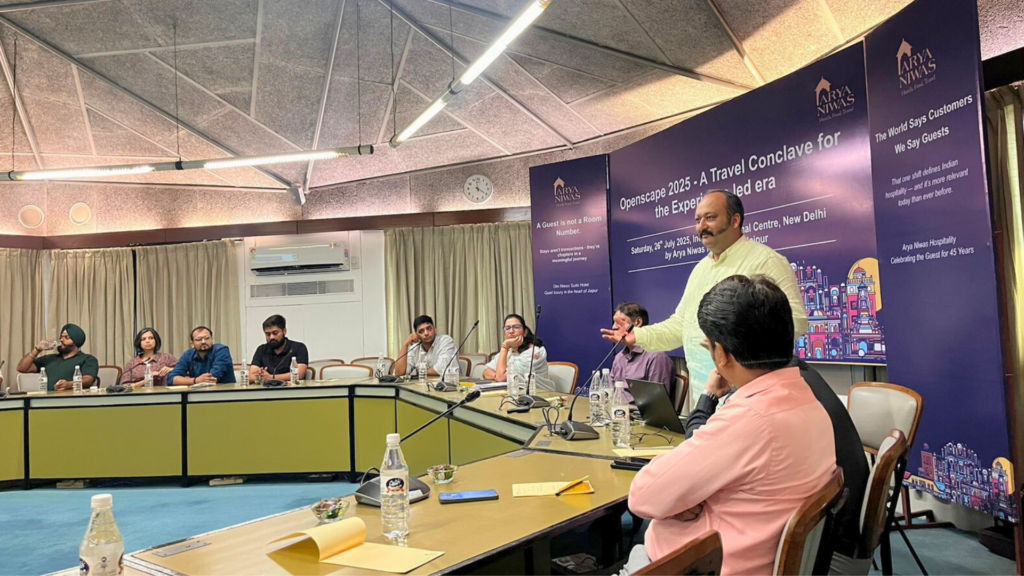AI in Travel
GCC Travel Tech Revolution: Autonomous Vehicles, AI, and Luxury Pilgrimage Services Set to Transform Middle East Tourism in 2025

Saturday, July 26, 2025
As the Middle East continues to invest heavily in its travel and tourism sectors, technology has become a key enabler of this transformation. By 2025, the region is poised to become a global leader in travel technology, with innovations that are set to revolutionize how people travel, experience destinations, and interact with transportation networks. The Middle East’s embrace of cutting-edge technology is part of a broader vision to position the region as a major player on the world stage for travel, culture, and economic diversification. Saudi Arabia’s Vision 2030, the UAE’s Smart Cities initiative, and Qatar’s push toward tourism diversification are driving investments that will ultimately enhance every aspect of the travel experience.
| Category | Company/Initiative | Technology/Development | Details |
|---|---|---|---|
| Autonomous Vehicles | WeRide (China) | Robotaxi Services | Expansion of autonomous vehicle services into the UAE and Saudi Arabia, with commercial operations expected by late 2025. |
| Pony.ai (China) | Robotaxi Services | Trials of autonomous taxis in Dubai and Saudi Arabia, targeting full commercial deployment by 2025-2026. | |
| Baidu (China) | Autonomous Vehicles | Partnership with UAE-based Autogo to deploy robotaxi services in Abu Dhabi, set for trials by the end of 2025. | |
| Artificial Intelligence (AI) | Humain (Saudi Arabia) | AI Infrastructure | Aiming to position Saudi Arabia as a leader in AI, developing AI services and infrastructure for various industries, including travel. |
| Airline Technology | Riyadh Air (Saudi Arabia) | Digital and Sustainable Air Travel | Backed by Saudi Arabia’s Public Investment Fund, focusing on digital technology and sustainability, with plans to connect over 100 destinations by 2030. |
| Travel Platform | Viavii (Jordan) | Experiential Travel Platform | AI and machine learning-powered platform connecting travelers with local hosts for personalized experiences across the Middle East. |
| Travel Metasearch | Wego (Singapore/UAE) | Metasearch Engine | Integration with over 5,000 hotels, providing a comprehensive platform for booking flights and accommodations, continually innovating in travel tech. |
| Pilgrimage Technology | Umrahme (Saudi Arabia) | Digital Pilgrimage Platform | A platform for managing Umrah pilgrimage, including accommodation booking, visa processing, and travel tips, aimed at streamlining the pilgrimage experience. |
| Sustainable Travel | Red Sea Project (Saudi Arabia) | Eco-friendly Resorts & Infrastructure | Developing luxury resorts powered by renewable energy and promoting eco-friendly travel practices, focusing on sustainable tourism. |
1. AI-Powered Travel Services: Personalizing Every Step of the Journey
Artificial intelligence (AI) has already become an integral part of the travel sector worldwide, and the Middle East is no exception. By 2025, AI-driven solutions will play an even larger role in reshaping the way travelers plan, book, and experience their trips. In the UAE, Qatar, and Saudi Arabia, several companies are integrating AI-powered tools into travel booking platforms, customer service, and real-time assistance.
One of the most notable developments in AI travel technology is the use of personalized travel recommendations. Companies like Wego (a travel metasearch engine) and Viavii (an experiential travel platform) are leveraging AI and machine learning to offer travelers tailored itineraries based on their preferences, travel history, and current trends. This level of personalization provides a much more refined travel experience, helping travelers to discover new destinations, find hidden gems, and make more informed decisions about their trips.
Airlines are also incorporating AI technology to enhance the passenger experience. For instance, Emirates Airlines has rolled out an AI-based chatbot to assist customers with bookings, check-in, and flight status updates. This is particularly useful during peak travel periods, reducing wait times and improving operational efficiency.
Furthermore, AI-driven systems are now being used for real-time updates on flight status, baggage handling, and even predicting delays or changes to itineraries. As AI becomes more integrated into the region’s travel infrastructure, travelers will benefit from smoother, more personalized journeys, allowing them to focus on enjoying their trips rather than navigating the complexities of travel logistics.
2. Smart Airports: Enhancing Efficiency and Passenger Comfort
The concept of smart airports is quickly gaining traction across the Middle East, and by 2025, most major airports in the region will incorporate digital solutions to create a seamless, efficient experience for passengers. In the UAE, the Dubai International Airport (DXB) has long been a pioneer in the use of technology to streamline the passenger journey. DXB is working to enhance its use of biometric facial recognition technology, AI-powered security systems, and real-time baggage tracking.
One of the key developments expected by 2025 is the widespread implementation of biometric systems that allow travelers to use their facial features or fingerprints to check in, pass through security, and board flights. This eliminates the need for boarding passes and reduces waiting times, making airports more efficient and accessible. Abu Dhabi International Airport is also implementing similar technologies to enhance passenger convenience and speed up the check-in process.
Additionally, airports in Saudi Arabia, including King Abdulaziz International Airport in Jeddah, are investing in digital solutions to improve passenger flow. From self-check-in kiosks to automated baggage drop-off points, these innovations are designed to reduce congestion and create a frictionless airport experience for travelers. AI-powered systems are also being used to predict potential bottlenecks at security checkpoints, allowing staff to redirect passengers to less busy areas.
Moreover, smart airports are incorporating digital signage and interactive kiosks to provide passengers with real-time information on flight status, gate changes, and other relevant updates. These systems ensure that travelers are well-informed at every stage of their journey, further enhancing convenience and customer satisfaction.
3. Autonomous Vehicles: Revolutionizing Transportation Networks
One of the most exciting developments in Middle Eastern travel technology is the rise of autonomous vehicles. The UAE, Saudi Arabia, and Qatar are leading the way in integrating self-driving cars and buses into their transportation networks, aiming to improve efficiency, reduce congestion, and provide passengers with a new level of convenience.
In Dubai, the Roads and Transport Authority (RTA) has partnered with WeRide, a Chinese autonomous vehicle company, to introduce robotaxi services in the city. The autonomous taxis are expected to provide a safer and more convenient mode of transport, particularly during peak hours when traffic congestion is a significant issue. The service, which is set to launch in 2025, will provide a seamless travel experience for visitors and residents alike, with passengers able to book rides using their smartphones.
Similarly, Pony.ai, another autonomous vehicle company, has also expanded its operations to the Middle East, with trials set to begin in Abu Dhabi and Riyadh. These vehicles will offer on-demand transport, allowing passengers to travel to their destinations without the need for human drivers. By 2025, autonomous vehicles are expected to play a central role in reshaping urban mobility in the region.
In addition to autonomous taxis, Saudi Arabia is investing in flying taxis or urban air mobility (UAM) solutions, with the goal of launching air taxis by 2026. These vehicles, powered by electric propulsion systems, will offer passengers a fast and environmentally friendly way to navigate congested urban areas.
4. Blockchain Technology for Secure Travel Transactions
Blockchain technology is making its mark on the Middle East travel industry in 2025. As one of the most secure and transparent technologies available, blockchain offers a solution to many of the challenges faced by travelers, including fraud prevention, secure payments, and identity verification.
Blockchain technology is being utilized to streamline the booking process, with travel platforms leveraging its secure ledger system to ensure that transactions are processed safely and efficiently. Saudi Arabia’s PIF-backed travel initiatives, including those related to digital visas, are utilizing blockchain to provide secure, tamper-proof systems for booking accommodations, flights, and car rentals.
Furthermore, blockchain can enhance travel security by allowing travelers to store their personal information in digital wallets. This eliminates the need for physical passports or paper records and allows travelers to prove their identity securely through blockchain-based certificates.
As blockchain technology becomes more widely adopted, it is expected to significantly reduce the risks of fraud and streamline payment systems, further enhancing the security and efficiency of travel transactions.
5. Sustainable Travel Technologies: Reducing Environmental Impact
Sustainability is at the forefront of travel technology developments in the Middle East. With growing concerns about climate change and environmental degradation, the region is increasingly focused on sustainable tourism solutions that minimize the carbon footprint of the travel industry.
By 2025, electric vehicles (EVs) are expected to become a common mode of transportation for tourists and residents alike. Countries like the UAE, Saudi Arabia, and Qatar are implementing EV infrastructure to ensure that tourists can travel sustainably throughout their visits. The development of charging stations for electric cars in cities and key tourist attractions will encourage travelers to opt for greener transportation options.
The Middle East is also focusing on sustainable aviation, with several airlines, including Emirates Airlines, exploring the use of sustainable aviation fuel (SAF) to reduce emissions. Additionally, airports in the region are implementing eco-friendly practices, such as energy-efficient terminals, solar power systems, and waste-reduction initiatives, to promote sustainability across the travel sector.
6. Digital Health Passports and Smart Services for Pilgrims
In light of the COVID-19 pandemic, digital health passports have become a critical component of travel in the Middle East. These digital health certificates allow travelers to store and share their vaccination records, test results, and other health-related documents in a secure, easily accessible format. Saudi Arabia, in particular, has implemented digital health passports for pilgrims traveling to Makkah and Madinah for Hajj and Umrah.
The use of digital health passports ensures that pilgrims and tourists comply with health and safety protocols, making travel safer and more efficient. In addition, smart services such as virtual reality (VR) tours of religious sites and AI-powered pilgrim assistance systems are improving the overall pilgrimage experience.
7. The Rise of Digital Travel Agencies and Booking Platforms
The traditional travel agency model is evolving in the Middle East, with digital platforms offering travelers personalized, AI-powered services. Companies like Wego and Viavii are providing travelers with customized itineraries, real-time booking options, and seamless payment solutions. These platforms use machine learning algorithms to understand individual preferences and suggest personalized travel experiences based on historical data and user input.
The shift toward digital booking platforms is expected to continue, as more travelers prefer the convenience of managing their trips through mobile apps and online services. These platforms also provide access to comprehensive information about destinations, accommodations, and activities, helping travelers make informed decisions.
8. Tourism Data and Analytics
Tourism data and analytics are becoming increasingly important for both travelers and service providers in the Middle East. Governments and tourism boards are using data analytics to predict tourist trends, identify emerging markets, and optimize travel infrastructure. By leveraging big data, the region is improving its ability to forecast tourism demand, enhance service delivery, and reduce overcrowding at popular tourist destinations.
AI in Travel
With focus on AI, sustainable travel Arya Niwas organises Openscapes 2025 in New Delhi

The opportunities and challenges that issues like artificial intelligence, sustainability and experiential travel pose to the tourism industry in India and overseas were highlighted at Openscapes 2025, a travel conclave in New Delhi on Saturday.
Organised by Arya Niwas, a hospitality group based in Jaipur, the conclave served as a participative platform to explore transformative ideas for the tourism sector, addressing pressing issues such as sustainability, experiential curation, the role of artificial intelligence (AI), and the integration of responsible practices into the travel experience.
Drawing stakeholders from across India’s hospitality industry, the conclave was organised with the core theme of Projecting India and Rajasthan with a stronger, more meaningful narrative.
“This is the first conclave. It is called Openscapes. We hope that we will be having more such dialogue-based conclaves on travel. There is a need for us to behave as one in the travel industry and to move forward together because the ultimate aim is to serve the guests and make the guests win,” Pooja Bansal, Owner and General Manager, Arya Niwas, told India & You on the sidelines of the event.
The urgency of the issues raised at the meeting was underscored by leading tour operators, who highlighted that Indian tourism, particularly in recent years, “has not been sustainable and things have gone really, really bad.”
The conclave drew stakeholders from across India’s hospitality industry
“When we talk about sustainability with experiential tourism, the experience at the grassroot level, meeting local people with a bit of sustainability, offers eye-opening encounters. Yet, there are challenges,” Navneet Arora, Managing Director, VINString Holidays, a travel agency in New Delhi, told India & You.
The meeting illustrated both obstacles and achievements in rural and urban experiential tourism. Operators cited instances where visitors’ immersion in heritage neighbourhoods and private homes fostered mutual pride among locals and tourists. However, they also warned against approaches that leave rural residents feeling like “monkeys in the zoo,” underscoring the necessity of responsible, respectful interaction, something now addressed by ensuring a share of tour proceeds benefit the communities involved. Sustainability, participants argued, extends well beyond eco-friendly rhetoric.
The conclave highlighted innovative tour formats, slow tourism, creative workshops and direct engagement with artisans, as pathways for deeper, more rewarding guest experiences.
“I think that is the call for the future, because automation has to come in. If we are not doing automation today, we are backwards. AI is important. The event opens up eyes for a lot of people. Difficult, but yes, AI and sustainability are important and doable,” Arora added.
“The interpretation of sustainability has become very cliché. This was a session to break that,” said Bansal.
Participants at the Openscapes 2025 called for a sustained dialogue, with suggestions for sector-wide conventions and targetted sessions on marketing and AI and more collaborative initiatives.
AI in Travel
Sabre Corporation’s Strategic Partnership with Christopherson Business Travel and Its Implications for Undervalued Cloud and AI Stocks

Sabre Corporation (NASDAQ: SABR) has long been a cornerstone of the global travel technology sector, but its recent strategic partnership with Christopherson Business Travel marks a pivotal evolution. By leveraging its AI-driven platform and cloud-native infrastructure, Sabre is not only modernizing corporate travel management but also positioning itself as a catalyst for growth in the undervalued travel tech sector. For investors, this collaboration offers a compelling case study in how AI and cloud innovation can unlock long-term value in a niche yet resilient market.
A Strategic Alliance for the Future of Corporate Travel
On July 17, 2025, Sabre announced a multi-year agreement to become Christopherson Business Travel’s primary technology partner. This partnership is more than a transactional arrangement—it’s a strategic alignment of two companies aiming to redefine corporate travel through automation, real-time data, and personalized service. Sabre’s AI-powered tools, including Sabre Red 360, Trip Proposal, and Market Intelligence, will streamline operations for Christopherson, enabling faster decision-making and enhanced client offerings.
The integration of Sabre’s cloud-native infrastructure into Christopherson’s proprietary Andavo platform is particularly noteworthy. This move allows for real-time orchestration of multi-source content (air, hotel, rail, ground) and seamless API-driven integrations, reducing manual effort and improving scalability. As Chad Maughan, CTO of Christopherson, noted, Sabre’s architecture provides the operational flexibility needed to adapt to evolving client demands—a critical advantage in the post-pandemic corporate travel landscape.
Sabre’s Financial Resilience and AI-Driven Growth
Sabre’s financial performance in 2024 underscores its transition from a turnaround story to a growth-oriented entity. Revenue increased to $3 billion, with adjusted EBITDA rising to $517 million—a 54% year-over-year improvement. While IT Solutions revenue dipped due to de-migrations, the Travel Solutions and Distribution segments grew by 4% and 6%, respectively, driven by demand for Sabre’s AI-powered tools.
The company’s market cap of $1.222 billion pales in comparison to AI/cloud giants like Databricks ($62 billion) or Snowflake ($43.6 billion), but this undervaluation reflects Sabre’s niche focus. Its strategic investments in Sabre Mosaic—a modular platform combining AI, cloud, and traditional agent workflows—position it to capture a larger share of the corporate travel market, which is projected to grow as businesses prioritize cost optimization and efficiency.
The AI/Cloud Travel Tech Opportunity
The broader travel tech sector is undergoing a transformation fueled by generative AI. According to Skift Research, AI-driven tools could create a $28 billion+ opportunity for the industry, with applications in personalized itineraries, dynamic pricing, and automated customer service. Sabre’s Automated Exchanges & Refunds and Agency Retailer solutions are already streamlining post-booking processes, reducing manual intervention by up to 70%.
However, Sabre is not alone in the race to monetize AI in travel. Competitors like C3.ai (NYSE: AI), Marvell Technology (NASDAQ: MRVL), and DigitalOcean (DOCN) are also leveraging cloud and AI to drive growth. C3.ai’s predictive analytics tools, for instance, have secured government contracts worth $450 million, while Marvell’s AI-optimized chips are powering data centers for hyperscale providers. Yet, Sabre’s deep vertical integration into travel-specific workflows gives it a unique edge in the corporate travel niche.
Why Sabre Is an Undervalued Investment
Despite its strategic advantages, Sabre remains overlooked by many investors. Its current price-to-earnings ratio (P/E) of 8.5 is significantly lower than the industry average of 18.5, and its hedge fund ownership (11.2%) suggests growing confidence in its AI-driven roadmap. The partnership with Christopherson is a validation of Sabre’s value proposition: it enables the company to scale its AI/Cloud offerings without overhauling existing systems, a critical factor for travel agencies seeking cost-effective modernization.
For investors, the key question is whether Sabre can replicate its success in other verticals. The company’s PowerSuite Cloud platform, which automates operations and integrates NDC content, is already gaining traction among mid-sized travel agencies. If Sabre can expand its footprint in the corporate and leisure travel markets, its revenue could outpace the 10% growth projected by analysts.
Conclusion: A Strategic Bet on AI-Driven Travel
Sabre’s partnership with Christopherson Business Travel is a microcosm of the broader shift toward AI and cloud-native solutions in travel technology. While the company may lack the valuation of tech giants like Microsoft or Google, its focus on vertical-specific innovation and operational efficiency makes it a compelling play for investors seeking exposure to the travel sector’s AI revolution.
For those considering a diversified portfolio, Sabre offers a unique blend of undervaluation and growth potential. However, it should be viewed as a complementary holding to broader AI/cloud stocks like C3.ai or Marvell, rather than a standalone bet. As the travel industry continues to embrace AI-driven automation, Sabre’s ability to deliver scalable, client-centric solutions will likely drive long-term value for both its partners and shareholders.
AI in Travel
AI Travel Tricks: Watch Out for the Road to Nowhere – Herald/Review Media

AI Travel Tricks: Watch Out for the Road to Nowhere Herald/Review Media
Source link
-

 Brand Stories6 days ago
Brand Stories6 days agoBloom Hotels: A Modern Vision of Hospitality Redefining Travel
-

 Brand Stories23 hours ago
Brand Stories23 hours agoCheQin.ai sets a new standard for hotel booking with its AI capabilities: empowering travellers to bargain, choose the best, and book with clarity.
-

 Destinations & Things To Do7 days ago
Destinations & Things To Do7 days agoUntouched Destinations: Stunning Hidden Gems You Must Visit
-

 AI in Travel7 days ago
AI in Travel7 days agoAI Travel Revolution: Must-Have Guide to the Best Experience
-

 Brand Stories3 weeks ago
Brand Stories3 weeks agoVoice AI Startup ElevenLabs Plans to Add Hubs Around the World
-

 Brand Stories2 weeks ago
Brand Stories2 weeks agoHow Elon Musk’s rogue Grok chatbot became a cautionary AI tale
-

 Asia Travel Pulse3 weeks ago
Asia Travel Pulse3 weeks agoLooking For Adventure In Asia? Here Are 7 Epic Destinations You Need To Experience At Least Once – Zee News
-

 Destinations & Things To Do19 hours ago
Destinations & Things To Do19 hours agoThis Hidden Beach in India Glows at Night-But Only in One Secret Season
-

 AI in Travel3 weeks ago
AI in Travel3 weeks ago‘Will AI take my job?’ A trip to a Beijing fortune-telling bar to see what lies ahead | China
-

 Brand Stories3 weeks ago
Brand Stories3 weeks agoChatGPT — the last of the great romantics











You must be logged in to post a comment Login